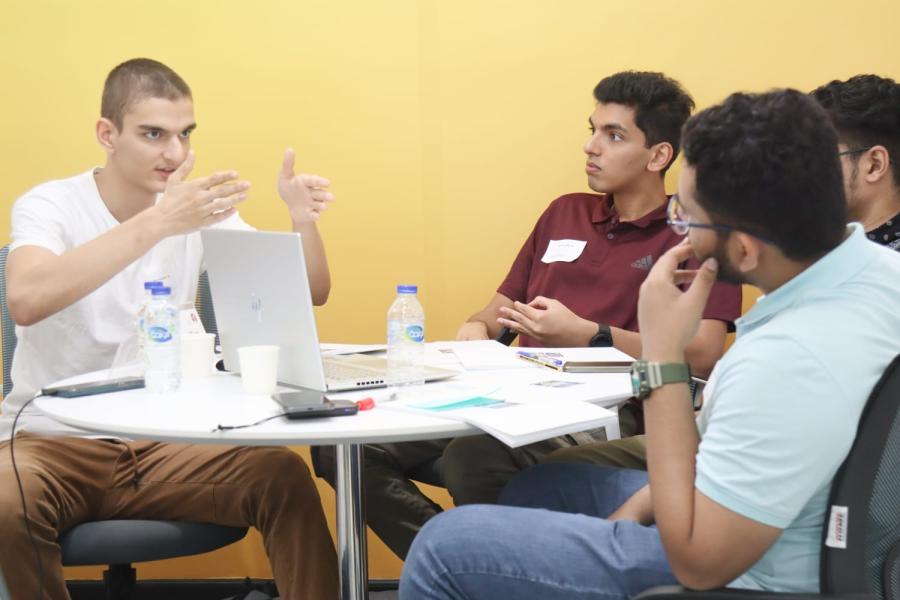- About
- Admissions
- Study at AUS
- Prospective Students
- Bachelor's Degrees
- Master's Degrees
- Doctoral Degrees
- Admission Publications
- International Students
- Contact Admissions
- Grants and Scholarships
- Sponsorship Liaison Services
- Testing Center
- New Student Guide
- File Completion
- New Student Orientation
- Payment Guide
- Executive Education
- Students with Disabilities
- Academics
- Life at AUS
- Research
- Contact Us
- Apply Now
- .

First-year CEN students cultivate innovative transportation solutions with slime mold
For some, the idea of a fungus taking over a city’s streets might sound like the plot of a science fiction film. For a group of students from the American University of Sharjah (AUS) College of Engineering, it sounded like an innovative way to seek new transportation solutions.
Using slime mold, also known as fungi Physarum polycephalum, a team of first-year AUS students produced a sustainable proposal to enhance the transportation system in the city of Sharjah as their entry for the Youth Impact Lab 2023 Competition, a collaborative initiative The Pearl Initiative and the Abu Dhabi Music and Arts Foundation. The team took home first place for their project, which benefited from the fungi’s natural ability to solve mazes.
When a food source is placed at one end of a maze, the fungus has the ability to branch out in all directions in search of it. Once it finds the food, it retracts all branches that did not locate it, leaving behind a trail of slime to avoid going into that direction in the future.
“In our experiment, we created a nutrient maze representing Sharjah, allowing the fungus to grow and form an optimal transportation network. This concept, previously successful in Japan, which is known for having one of the best transportation systems globally, inspired our approach. We proposed starting with a low-risk reorganization of existing transportation modes. Once the new system's effectiveness is proven, gradual investment by the Sharjah Roads and Transport Authority (SRTA) would lead Sharjah to have one of the world's premier transportation systems. Our project stood out for its realistic approach and clear governance plans, making it a feasible solution to the transportation challenge,” said Hasan Akel, majoring in computer science and mathematics.
The project, proposed under the theme of “Sustainable Cities,” looked at utilizing current transportation assets such as buses, as well as developing a maglev train, underground tunnels and a metro system. The team now wants to present the project to the SRTA.
Akel, who proposed the initial project idea, worked closely with teammates computer engineering student Rizwanul Abidin Asim, mechanical engineering major Muhammad Salman, computer science and math student Salim Akel, and Computer Engineering student Ryhan Nijam.
“Under our neoteric solution with the help of a fungus chooses that chooses the best possible path to reach its destination, we were able to propose best possible routes for buses; metro lines that could be stretched to the borders of Ajman and Dubai, leading the three emirates to work collaboratively; a maglev train that runs from Al Majaz to Khor Fakkan, thus facilitating tourism; and underground tunnels that could begin from densely populated areas to the industrial areas in Sharjah to minimize traffic on highways like E311 and E11,” said Asim.
In their 10-minute presentation to a judging panel, the team addressed the economic, social and governance aspects of their project.
Salman was responsible for the social aspect of the project, determining how to improve the transportation system to generate a positive social impact on people's lives. While still in his first year of studies, Salman said that the NGN 110 course, which is a foundational course taken by AUS engineering students, has helped him in this project.
The AUS College of Engineering (CEN) organizes an annual NGN 110 competition that encourages students to come up with innovative ideas to solve problems. The NGN 110 course and competition taught students soft skills such as teamwork, critical thinking and problem solving, which Salman and Iqbal said came in handy during this competition.
“We learned a lot about teamwork and teambuilding during NGN 110 and that helped us a lot. We were open to ideas and constructive criticism and none of us got offended if their ideas were not considered by the team. We also ensured that all the major decisions pertaining to the project and presentation were based on the group’s consensus,” said Iqbal.
CEN fosters a collaborative learning environment, encouraging students to engage in hands-on projects, research initiatives, and internships that prepare them for real-world challenges. It is equipped with state-of-the-art facilities and laboratories, providing students with the resources they need to excel in their studies. Emphasizing a global perspective, CEN prepares students to be leaders in their respective fields, contributing to the advancement of technology and engineering solutions on a global scale.
To learn more about CEN, visit www.aus.edu/cen.

